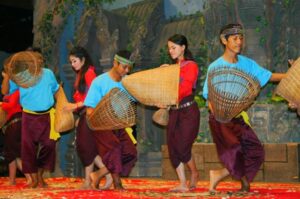🇰🇭 Cambodian Culture: A Quick Overview
Cambodian culture—rooted in the ancient Khmer Empire—is one of Southeast Asia’s oldest and richest cultural traditions. It blends history, religion, art, and everyday village life into a unique identity that still thrives today.
1. Religion & Spiritual Life
-
Theravada Buddhism is the heart of Cambodian culture.
-
Monks, pagodas, and daily spiritual rituals shape community life.
-
Many Cambodians also blend animist and Hindu traditions—seen in spirit houses, festivals, and temple iconography.
2. Traditional Arts
-
Apsara dance: graceful, symbolic hand gestures and shimmering silk costumes.
-
Traditional music: pin peat orchestra, drums, flutes, and ceremonial music.
-
Craftsmanship: silk weaving, stone carving, lacquerware, silverwork—skills passed down for generations.
3. Language
-
Khmer is the official language and one of the world’s oldest alphabets.
-
It influences place names, temple inscriptions, and classical literature.
4. Festivals & Celebrations
-
Khmer New Year (Choul Chnam Thmey) – April
-
Pchum Ben – ancestor remembrance
-
Water Festival (Bon Om Touk) – boat races and river celebrations
These festivals bring communities together with food, blessings, and music.
5. Food & Culinary Traditions
-
Flavours are mild, fresh, and aromatic.
-
Signature dishes: amok, lok lak, nom banh chok, and tropical fruits.
-
Meals are shared—reflecting the culture’s emphasis on family and community.
6. Community & Lifestyle
-
Cambodian society is warm, respectful, and family-centered.
-
Rural traditions remain strong: farming, fishing, and seasonal celebrations.
-
Hospitality and politeness—especially through gestures like the sampeah—are core values.
7. Heritage & Landmarks
-
Angkor Wat: symbol of national pride and world heritage.
-
Ancient temples, floating villages, royal palaces, and French-colonial cities show Cambodia’s layered history.

